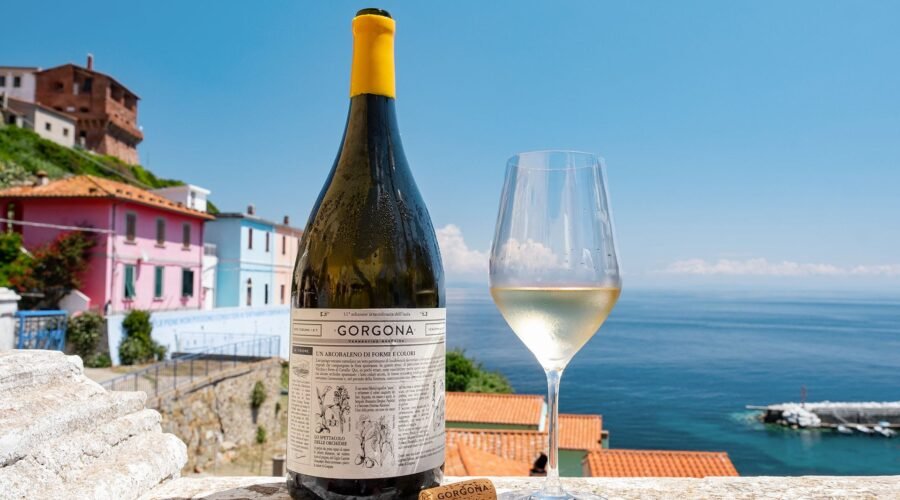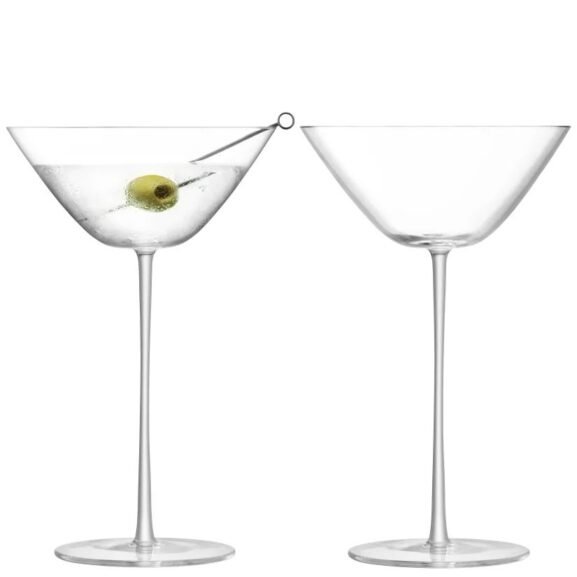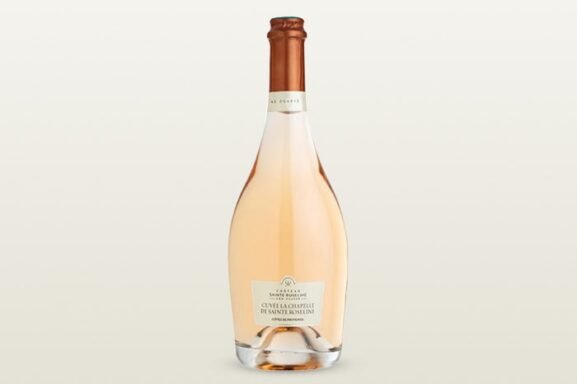At Gorgona Prison, Wine Changes Lives
Lamberto Frescobaldi, president and 30th generation to head wine producer Marchesi de’ Frescobaldi, vividly remembers the first time he tasted a wine produced on the island of Gorgona, which is located about 20 miles from Livorno off Italy’s Ligurian coast. Since 1869, Gorgona has been home to the Gorgona Agricultural Penal Colony, an Italian prison farm.
The blend of Ansonica and Vermentino grapes may not have been elegantly made, but it demonstrated great promise. It was made at the hands of an untrained winemaker—a Muslim man named Samir who had never himself tasted the wine. He was forbidden to drink, both by the penal system and his religious beliefs.
“You could taste the potential,” says Frescobaldi. “You could see that there was something going on. You could feel the sea, the sage, the saltiness and the complexity.”
He was sold on the project. Just over a decade later, Gorgona has become one of Marchesi Frescobaldi’s most notable projects and a particular passion for Frescobaldi himself.
You May Also Like: Indigenous Grapes Create a New Era for Sicilian White Wine
How It Started
Long before it was a prison, the property was run by the church, “so there’s always been vineyards there,” says Frescobaldi. In 1989, the University of Pisa’s Department of Agriculture took over the project, planting the particular vines in 1999 that produced the wine Frescobaldi would eventually taste.
In 2012, years after the University of Pisa pulled out of the project, then-director of the prison Maria Grazia Giampiccolo reached out to numerous Italian wineries. She sought a potential partnership to help maintain the island’s 2.5-acre vineyard and improve the winemaking program. Frescobaldi was the only one to respond.
“It was already August,” he says of his first visit. “Harvest is once a year, so it was a matter of… if we wanted to do it, let’s go for it.” Ten days later, the project began in earnest. Working with Samir and a winemaker from Frescobaldi, “the first thing we did was establish better canopy management, begin grape analysis, clean up the cellar and fix some of the machinery,” he recalls. In rehabilitating both the winery and the incarcerated people who would work with Frescobaldi, this approach was “nothing so radical,” he says. “Only fixing what they had.”
Soon after, a couple of acres of red Sangiovese and Vermentino Nero wines were planted. In 2015, the winery released its first vintage of Gorgona Rosso.

A National Badge of Honor
By several metrics, the Gorgona project has been a huge success. For one, the sought-after wine can retail for well over $100 USD and the program has expanded significantly. Vineyard size has more than doubled since its inception, additional plantings are in the works and Marchesi Frescobaldi has a committed agreement with Gorgona Penitentiary until 2044.
“The Italian minister [of the justice system] visited for the first time in 2022,” says Frescobaldi. “So we must be doing something right.”
But arguably more important is the winemaking program’s impact on participants, who by all accounts have a deep sense of pride in their work. They receive an hourly wage and pension, which helps them to envision a future beyond incarceration. Frescobaldi recalls one incarcerated man who told him, upon receiving his first paycheck, that he’d never been on payroll before in his life.
“He must have been in his forties,” says Frescobaldi. That tangible check meant everything to him. “He told me that his kids could now say that their father wasn’t an inmate at Gorgona,” Frescobaldi adds. “But rather that their father was at Gorgona working for Frescobaldi.”
Frescobaldi estimates that more than 50% of the 150 individuals who have worked in the prison winery program have gone on to work at Marchesi de’ Frescobaldi for at least one year following their release.
You May Also Like: Wineries that Let You Drink for Good
Perhaps nothing speaks more to the success of the program, however, than the recidivism rate of former Gorgona program participants. Giuseppe Renna, the current director of Gorgona Penitentiary and a veteran employee of the Italian penitentiary system for 27 years, says that the national rate of reoffense “is about 75%.” This is well above the international average, which can range from between 25% to 60% depending on the country.
“Of course, it’s totally the opposite for Gorgona,” he says. Renna estimates that over 90% of the incarcerated people who work for Frescobaldi never return to the penitentiary system. The rate is similar to that of other prison rehabilitation programs in which participants are taught a skill that imbues confidence and prepares them to re-enter society. “The system is betting on them, and we are recreating citizens,” says Renna. “You cannot put a price on that.”

Lessons Learned at Gorgona
Gorgona is a privileged placement for those at the end of long sentences who have demonstrated exemplary behavior and an ability to work. The length of their sentences also contributes to the success of the program, Frescobaldi believes.
“They are very fragile,” he says, compared to incarcerated people who are only serving time for a couple of years. “They have everything to lose again.”
Long sentences often means that the crimes committed were serious and often violent in nature. Frescobaldi recalls an early anecdote from the partnership, one that helped him establish a necessary mindset. One man had approached Frescobaldi, requesting to be included in the wine project. (All incarcerated people at Gorgona are part of a self-sustaining workforce, though not all are involved in winemaking.) Frescobaldi asked a prison guard what the man had done to become incarcerated. When he learned of his crime, Frescobaldi’s instinct was to recoil.
“Don’t judge him,” advised the guard. “He has already been judged by the authorities, and he is serving his time. Who are you to judge?”
Frescobaldi no longer inquires about participants’ backgrounds. Instead, he focuses on their demonstrated character and work ethic while preparing them to reenter society. That begins with one of the first tasks assigned—pruning.
“Pruning is something that is very nice psychologically—to cut away what is not needed, to have a vision for what the vine can produce, and to cut [in a way] so that you can see where it can grow,” Frescobaldi says. Day by day, as workers see how the vines respond to their care, “they realize they’re becoming part of this ecosystem,” he adds. “Vines can be very generous. They can survive, but they also rely on you.”
You May Also Like: Wine Growers Have a Pruning Problem—Here’s How Some Are Trying to Fix It

Looking to the Future
Due to the success of the Gorgona program, other prisons—as far reaching as Washington State in the U.S. and Japan—have reached out to Frescobaldi for counsel. He has two main suggestions: Work with incarcerated people with longer sentences versus shorter ones, and don’t stop at simply putting incarcerated people to work in a vineyard. They must also make the wine and see tangible results. The wines made in these programs, he believes, carries the maker’s stories with it. “It’s a message in a bottle,” he says.
He also stresses the importance of process over the final result. “Don’t look for the benefits,” he says, like high-quality wine that can be sold for luxury prices. “If you do things properly, the benefits will come. If you do it for recognition, you won’t have the patience, because it’s a day-to-day job.”
As for Gorgona itself, the prison is planning to further expand the program. The Italian government has allocated more space to enlarge the vineyards by another 50%, due to its proven track record of success.
People are like wine grapes, Frescobaldi believes. They are a product of their environment, for better or for worse. “We’re giving people a second life,” says Frescobaldi. “It’s amazing.”
Published: January 10, 2024


